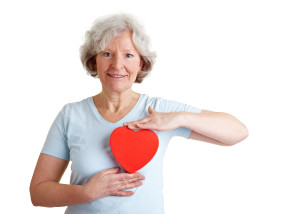Every Second Counts. Don’t Ignore the Symptoms of a Major Heart Event.
 People who suffer from major heart events, such as heart attack and stroke, too often report noticing symptoms, but being too afraid of what they may mean to seek medical care. If you think you could be having a heart event, never hesitate to seek medical treatment. Even if your symptoms represent a minor, non-heart related illness, you owe it to yourself and your loved ones to question what you’re feeling.
People who suffer from major heart events, such as heart attack and stroke, too often report noticing symptoms, but being too afraid of what they may mean to seek medical care. If you think you could be having a heart event, never hesitate to seek medical treatment. Even if your symptoms represent a minor, non-heart related illness, you owe it to yourself and your loved ones to question what you’re feeling.
This February, in honor of American Heart Health Month, familiarize yourself with the signs and symptoms of heart attack and stroke, and make a promise to yourself that if you suspect you could be experiencing the onset of a heart event, you will seek medical care immediately.
Heart Attack Symptoms
The symptoms of a heart attack may include:
- Pain or discomfort in the chest that lasts for more than a few minutes, or may go away, only to come back. The discomfort may feel like pressure, squeezing, a fullness in the chest, or pain.
- Discomfort or pain in parts of the upper body, such as one or both arms, the back, the stomach, the neck, or jaw.
- Difficulty breathing or shortness of breath. This symptom may present with or without chest pain or discomfort.
- Breaking out in a cold sweat.
- Nausea.
- Lightheadedness.
What to Do if You Suspect You’re Experiencing a Heart Attack
Reacting immediately to the signs of a possible heart attack can help to limit damage to your heart. Call 911, rather than attempting to drive yourself to the emergency room. When your heart is in danger, ever second counts. The minutes it will take you to drive to the emergency room are critical, and allowing emergency personnel to begin treating you that much sooner could make a significant difference in your recovery.
Stroke Symptoms
The symptoms of a stroke may include:
- Feeling as if one side of your face is numb, or the appearance that one side of your face is drooping. When you smile, your mouth may look uneven.
- Difficulty speaking, or slurred speech. You may also find it difficult to repeat back phrases or sentences.
- Weakness or numbness is one arm. When raising both arms in the air, one arm may want to drift downward.
What to Do if You Suspect You’re Experiencing a Stroke
Just like with a heart attack, every second for a stroke victim is critical. When a stroke occurs, a blood vessel bursting, or clotting in the brain is robbing the brain of precious oxygen. If you believe you may be having a stroke, act quickly to minimize potential brain damage. Call 911 immediately.
Many stroke victims report feeling sleepy after the event occurs. You must resist the urge to rest or go to sleep. Call 911 and seek medical treatment as soon as you suspect an incident has occurred. Just like with a heart attack, allow emergency responders to drive you to the hospital, rather than driving yourself, to ensure you are receiving treatment as quickly as possible.
More
